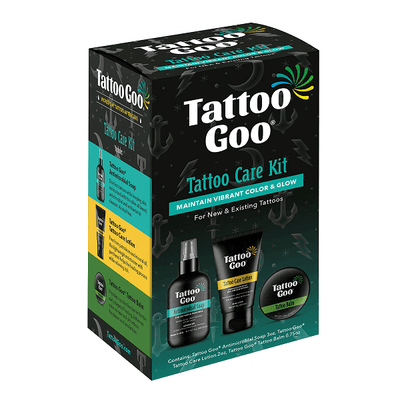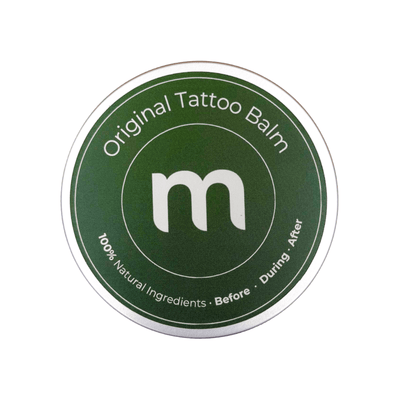Many people hesitate to get tattoos because of widespread tattoo myths that create unnecessary fears about pain, health risks, and professional consequences. These misconceptions can prevent individuals from expressing themselves through body art or cause anxiety for those already inked.
In this guide, we’ll debunk the seven most common tattoo myths, offering clear, reliable information to help you make informed decisions about tattoos, free from myths and misunderstandings.
And to ensure your new tattoo heals perfectly and maintains its vibrancy, consider using specialised aftercare products like MTS Tattoo Balm to support and enhance the healing process.
Explore our range of premium tattoo aftercare products and give your artwork the care it deserves.
What are tattoo myths?

Tattoo myths are widely held but incorrect beliefs about tattoos and the process of tattooing. These myths can range from misconceptions about the pain involved in getting a tattoo to false ideas about the health risks or social implications of having tattoos.
For instance, some people mistakenly believe that tattoos are entirely too painful, that they prevent you from donating blood, or that they are not suitable in professional environments.
Debunking these myths is important for understanding the real risks and benefits of tattoos and appreciating them as a form of personal and artistic expression.
1. Tattoos are extremely painful
The experience of getting a tattoo varies widely among individuals. Pain tolerance, the tattoo's location, and the session's duration all significantly affect how much discomfort you might feel.
For instance, fleshy areas like the arms or thighs often hurt less than bony areas like the spine or ribs. While tattoos do involve needles, many people describe the sensation as tolerable, with some even finding it meditative.
2. Tattoos prevent you from donating blood

The belief that tattoos completely disqualify you from donating blood is outdated. In reality, the regulations depend on where you got your tattoo and the sanitary conditions of the establishment.
In many places, as long as your tattoo was applied in a licensed tattoo shop that uses sterile techniques, you can donate blood after a short waiting period—typically about four months—to ensure no infections have been transmitted.
3. Tattoo ink can poison you
Modern tattoo inks are specially formulated to be safe for skin injection. While it’s true that tattoo inks are not regulated by major health agencies like the FDA, reputable ink manufacturers comply with high safety standards. Allergic reactions to ink are rare, but it’s always a good idea to discuss potential allergies with your tattoo artist beforehand.
4. Tattoos fade away completely over time
Although tattoos do fade over the years, they are designed to be permanent. Sun exposure, lifestyle choices, and the passage of time can affect the vibrancy of a tattoo's colours, but they won't disappear entirely. Proper aftercare, including regular moisturising and sun protection, can help maintain a tattoo's appearance.
5. You can't get an MRI if you have tattoos
There's a kernel of truth here—some older tattoo inks contained metals that could react during an MRI scan, potentially causing discomfort. However, most modern tattoo inks are MRI-safe.
If you have tattoos and need an MRI, inform the technician ahead of time; they will take precautions to ensure your safety and comfort.
6. Tattoos are not professional
The perception of tattoos in professional settings has evolved dramatically. Today, many industries embrace employees with tattoos, recognizing them as a form of personal expression.
Of course, visibility and appropriateness can still vary by profession, but the blanket stigma against tattoos in the workplace is fading.
7. Only certain types of people get tattoos

Tattoos are for anyone interested in them—there's no specific "type" of person who gets tattoos. They are a popular form of self-expression across various ages, races, genders, and social statuses.
Final thoughts
To wrap it up, the myths surrounding tattoos are as varied and colourful as the tattoos themselves. We debunk the seven most common tattoo myths to provide a clearer, more accurate view of tattooing, encouraging a better understanding and greater confidence among both tattoo enthusiasts and sceptics alike. Remember, knowledge is key when considering any form of body art.
For experienced tattoo artists and even newbies looking to deliver the best tattooing process and results for their clients, having the right tools is essential. Explore our extensive range of tattoo products, including premium inks, advanced tattoo machines, and comprehensive supplies for tattoo shops, all designed to enhance your artistry and ensure the utmost satisfaction for your clients.
Visit our website today and equip yourself with the best tattoo products on the market. Elevate your art, one tattoo at a time and be one of the professional tattoo artists.




























































 Studio supplies
Studio supplies












 Power & batteries
Power & batteries







 Aftercare
Aftercare



















 Apprentice
Apprentice


 Piercing & jewellery
Piercing & jewellery







 PMU supplies
PMU supplies



 New arrivals
New arrivals
 Gift vouchers
Gift vouchers
 Shop all
Shop all










































